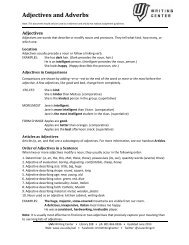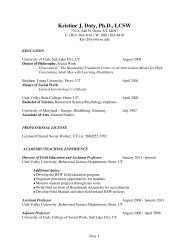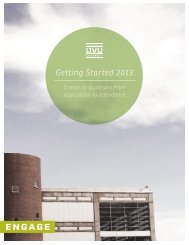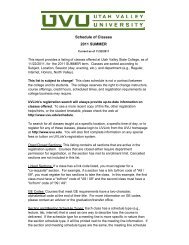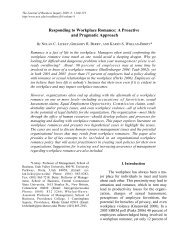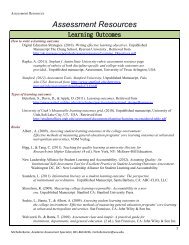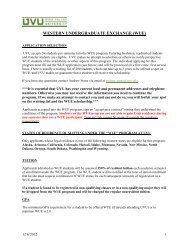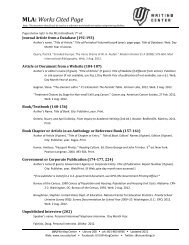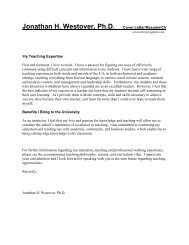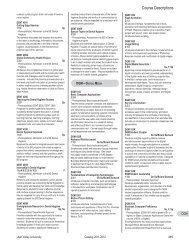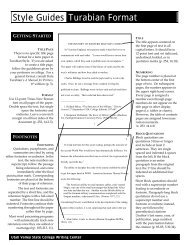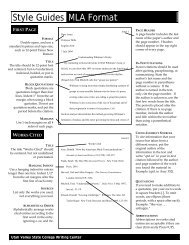Using Case Studies to Develop Critical Thinking Skills in ... - uvu.edu
Using Case Studies to Develop Critical Thinking Skills in ... - uvu.edu
Using Case Studies to Develop Critical Thinking Skills in ... - uvu.edu
- No tags were found...
You also want an ePaper? Increase the reach of your titles
YUMPU automatically turns print PDFs into web optimized ePapers that Google loves.
20 Teach<strong>in</strong>g Ethics, Fall 2002ethics is what society tells one <strong>to</strong> do, or that ethics is a private matterwhich should not be discussed <strong>in</strong> any public forum. In addition, studentscome <strong>in</strong><strong>to</strong> class with a number of bad habits of m<strong>in</strong>d, such as a tendency<strong>to</strong> adopt false dicho<strong>to</strong>mies or <strong>to</strong> accept wholesale generalizations, whichhobble their ethical th<strong>in</strong>k<strong>in</strong>g. Provid<strong>in</strong>g the opportunity for exercis<strong>in</strong>ganalytical th<strong>in</strong>k<strong>in</strong>g skills by utiliz<strong>in</strong>g case studies helps <strong>to</strong> overcome theseimpediments <strong>to</strong> learn<strong>in</strong>g.In my view, ethics consists <strong>in</strong> the construction of a critically reflectivemorality. Ethics is critical s<strong>in</strong>ce it leaves itself open <strong>to</strong> exam<strong>in</strong><strong>in</strong>g andreexam<strong>in</strong><strong>in</strong>g reasons from all sources and discipl<strong>in</strong>es. Ethics is reflective <strong>in</strong>that a conscientious moral agent is constantly try<strong>in</strong>g <strong>to</strong> achieve a delicatebalance which takes <strong>in</strong><strong>to</strong> account the effect of these reasons on his or herdeepest values. By contrast, a morality, or set of mores, is a set of rules,norms, or understand<strong>in</strong>gs that may be followed even by a non-reflectiveperson. So, while ethics is a form of morality, a morality is not necessarilyethical. To consider ethics as a critically reflective morality highlights thefact that ethics is a process of th<strong>in</strong>k<strong>in</strong>g, not a set of established answerswhich need only <strong>to</strong> be passively accepted.This conception views ethics as a method of discovery and not as abody of knowledge. Ethics does not consist <strong>in</strong> know<strong>in</strong>g the answers but<strong>in</strong>stead <strong>in</strong> know<strong>in</strong>g how <strong>to</strong> <strong>in</strong>quire; <strong>in</strong> particular, <strong>in</strong> know<strong>in</strong>g what countsas a possible answer, what questions are appropriate and constructiveones <strong>to</strong> ask, what tendencies <strong>in</strong> one’s own th<strong>in</strong>k<strong>in</strong>g need <strong>to</strong> be kept <strong>in</strong>check, et cetera. Promot<strong>in</strong>g the development of critical th<strong>in</strong>k<strong>in</strong>g skillssupports the very enterprise of help<strong>in</strong>g students <strong>to</strong> become (better) ethicalth<strong>in</strong>kers, given this substantive conception of ethics as a criticallyreflective morality aimed at identify<strong>in</strong>g, exam<strong>in</strong><strong>in</strong>g, and address<strong>in</strong>g practicalproblems. I will now proceed <strong>to</strong> illustrate the important contributionof case studies <strong>to</strong> this process by turn<strong>in</strong>g <strong>to</strong> the two case studies themselves.THE NASH CASEIn the two cases I will discuss, the follow<strong>in</strong>g central ethical questionb<strong>in</strong>ds them <strong>to</strong>gether: To what extent do medical professionals have anobligation <strong>to</strong> follow the desires of potential parents? The first case is tha<strong>to</strong>f the Nashes. Lisa and Jack Nash were both carriers of a recessive genefor Fanconi anemia and therefore had a twenty-five percent chance ofproduc<strong>in</strong>g a baby with the disease. Fanconi anemia prevents the afflictedperson from produc<strong>in</strong>g his or her own bone marrow. This disease will



